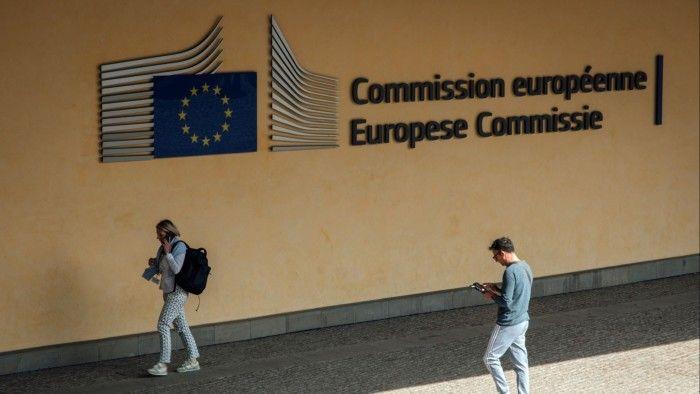EU Seeks to Ease AI Compliance Burden for Startups
2 Sources
2 Sources
[1]
Europe wants to lighten AI compliance burden for startups
BRUSSELS, April 8 (Reuters) - The European Commission plans to seek feedback to help lighten the regulatory burden for startups struggling to comply with European Union rules on the use of artificial intelligence, according to a Commission document seen by Reuters. The move is the latest by the EU executive to water down legislation enacted in recent years following complaints by businesses across Europe about the volume and cost of red tape hampering their operations. "There is an opportunity to minimise the potential compliance burden of AI Act, particularly for smaller innovators," said the document, the AI Continent Action Plan. "The Commission aims to build on the first learnings from the current implementation phase and identify further measures that are needed to facilitate a smooth and simple application of the AI Act," it said. EU tech chief Henna Virkkunen will present the measure on Wednesday. The 27-country European Union signed off the landmark AI Act last year, a more comprehensive rulebook than the United States' light-touch voluntary compliance approach. China's AI regulations aim to maintain social stability and state control. The AI Act imposes strict transparency obligations on high-risk AI systems, while the requirements for general-purpose AI models are lighter. Reporting by Foo Yun Chee; Editing by Kevin Liffey Our Standards: The Thomson Reuters Trust Principles., opens new tab Suggested Topics:Boards, Policy & RegulationRegulatory Oversight Foo Yun Chee Thomson Reuters An agenda-setting and market-moving journalist, Foo Yun Chee is a 21-year veteran at Reuters. Her stories on high profile mergers have pushed up the European telecoms index, lifted companies' shares and helped investors decide on their next move. Her knowledge and experience of European antitrust laws and developments helped her break stories on Microsoft, Google, Amazon, Meta and Apple, numerous market-moving mergers and antitrust investigations. She has previously reported on Greek politics and companies, when Greece's entry into the eurozone meant it punched above its weight on the international stage, as well as on Dutch corporate giants and the quirks of Dutch society and culture that never fail to charm readers.
[2]
Europe wants to lighten AI compliance burden for startups
The European Commission plans to gather feedback to ease the regulatory burden on startups struggling with AI compliance under EU rules. The AI Continent Action Plan aims to reduce the compliance load, particularly for smaller innovators. EU tech chief Henna Virkkunen will present the proposal on Wednesday.The European Commission plans to seek feedback to help lighten the regulatory burden for startups struggling to comply with European Union rules on the use of artificial intelligence, according to a Commission document seen by Reuters. The move is the latest by the EU executive to water down legislation enacted in recent years following complaints by businesses across Europe about the volume and cost of red tape hampering their operations. "There is an opportunity to minimise the potential compliance burden of AI Act, particularly for smaller innovators," said the document, the AI Continent Action Plan. "The Commission aims to build on the first learnings from the current implementation phase and identify further measures that are needed to facilitate a smooth and simple application of the AI Act," it said. EU tech chief Henna Virkkunen will present the measure on Wednesday. The 27-country European Union signed off the landmark AI Act last year, a more comprehensive rulebook than the United States' light-touch voluntary compliance approach. China's AI regulations aim to maintain social stability and state control. The AI Act imposes strict transparency obligations on high-risk AI systems, while the requirements for general-purpose AI models are lighter.
Share
Share
Copy Link
The European Commission plans to gather feedback on lightening the regulatory load of the AI Act for startups, aiming to balance innovation with compliance.

European Commission Seeks to Ease AI Compliance for Startups
The European Commission is taking steps to address concerns about the regulatory burden imposed by the EU's landmark AI Act, particularly on startups and smaller innovators. According to a Commission document titled "AI Continent Action Plan," the EU executive body plans to seek feedback to help lighten the compliance load for businesses struggling with the new artificial intelligence rules
1
.Balancing Innovation and Regulation
The move comes in response to complaints from businesses across Europe about the volume and cost of red tape hampering their operations. The Commission recognizes the need to strike a balance between ensuring responsible AI development and fostering innovation in the rapidly evolving tech sector.
"There is an opportunity to minimise the potential compliance burden of AI Act, particularly for smaller innovators," states the AI Continent Action Plan
1
. This initiative aims to build on early lessons from the current implementation phase and identify measures to facilitate a smoother application of the AI Act.EU's Comprehensive AI Rulebook
The European Union signed off on the AI Act last year, establishing a more comprehensive regulatory framework compared to the United States' light-touch voluntary compliance approach. The EU's regulations impose strict transparency obligations on high-risk AI systems, while maintaining lighter requirements for general-purpose AI models
2
.Related Stories
Upcoming Presentation and Global Context
EU tech chief Henna Virkkunen is scheduled to present the measure on Wednesday, highlighting the importance of this initiative in the broader context of European tech policy
1
.The EU's approach to AI regulation stands in contrast to other major players in the global AI landscape. While the EU seeks a balanced approach, China's AI regulations primarily aim to maintain social stability and state control
2
.Implications for the European Tech Ecosystem
This initiative to ease the regulatory burden on startups could have significant implications for the European tech ecosystem. By addressing the concerns of smaller innovators, the EU aims to maintain its competitive edge in the global AI race while upholding its commitment to ethical and responsible AI development.
As the Commission gathers feedback and refines its approach, stakeholders in the AI industry will be watching closely to see how these potential changes might affect their operations and the overall landscape of AI innovation in Europe.
References
Summarized by
Navi
Related Stories
EU Considers Delaying AI Act Provisions Amid Pressure from Trump Administration and Big Tech
07 Nov 2025•Policy and Regulation

Europe Retreats on Tech Regulation: GDPR and AI Act Face Major Rollbacks Under Industry Pressure
19 Nov 2025•Policy and Regulation

EU Considers Loosening AI and Data Regulations Amid US Competition
10 Apr 2025•Policy and Regulation

Recent Highlights
1
Google Gemini 3.1 Pro doubles reasoning score, beats rivals in key AI benchmarks
Technology

2
Meta strikes up to $100 billion AI chips deal with AMD, could acquire 10% stake in chipmaker
Technology

3
Pentagon threatens Anthropic with supply chain risk label over AI safeguards for military use
Policy and Regulation





